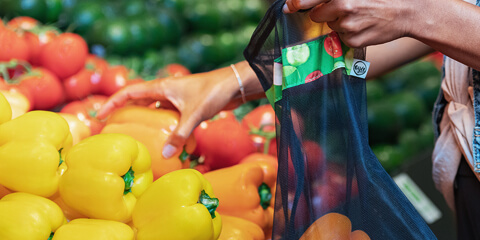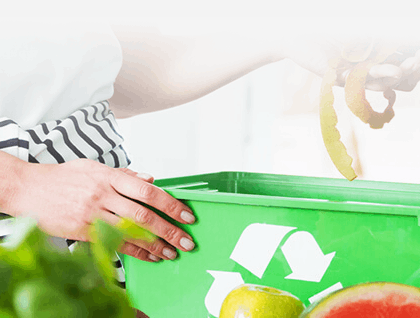ON THIS PAGE
We are committed to reducing our environmental impact, fighting climate change, and protecting the planet for future generations. For all these reasons, reducing single-use plastics throughout our operations is a priority for us. We know our customers care about the environment and are ready to work with us to reduce the use and impacts of single-use plastics. And the need to act is now. The very same durability that has made plastic a useful way to protect our food and goods means it accumulates and persists in our landfills, waterways and ecosystems for hundreds and sometimes thousands of years. Businesses like ours have a huge role to play in helping shape policy, influencing suppliers and putting in place processes that make it easier to reduce, reuse and recycle — fostering circular economies.
Our Approach
We are doing OurPartTM to manage waste from our stores and warehouses more efficiently over time and send increasingly less to landfills. Our approach includes implementing best practices from inside our family of stores and in the wider industry to provide our frontline teams with the tools, guidance and support needed to divert as much waste as possible from landfills.
Our biggest action to date has been the elimination of single-use plastic grocery bags at our store checkouts, removing 800 million single-use plastic bags out of circulation. Our next step is to evaluate all areas of our stores where we can remove avoidable and hard-to-recycle plastics, increase the recyclability of the packaging that remains, and drive toward a circular economy where packaging can be used and reused again and again.
Top of mind for us is to provide our customers with fresh, quality food and goods that meet safety and security standards. Packaging plays a vital role in ensuring these important qualities are protected for our customers. We realize that packaging cannot be removed completely, so our goal is to achieve no packaging waste.
To achieve this goal, we’re focused on making our packaging more sustainable, minimizing its impact on the environment throughout its entire lifecycle.
Our Approach to Sustainable Packaging:
Eleminate unnecessary material wherever possible without increasing product losses.
Select materials that can be recycled or composted in the majority of jurisdictions in Canada.
Design packaging to be as small as possible while protecting the product.
Avoid secondary and tertiary packaging by designing a sturdy primary package.
Avoid glue and laminations, as this can make it difficult to separate materials for proper recycling.
Proper trials or pilots are required to ensure packaging changes do not impact the product through its lifecycle.
Certain characteristics of plastic packaging (such as colour, labels and additives) can pose major challenges for our current recycling systems in Canada. In fact, only nine per cent of plastics generated in Canada is recycled. Despite this, plastic packaging can be used and managed in a more sustainable way. This is done by:
- Removing avoidable plastics (e.g. removing or reducing over-packaging)
- Removing hard-to-recycle plastics (i.e. plastics for which there is limited or no collection, processing and/or end-market widely available across Canada to support recycling)
- Increasing recyclability (i.e. moving to the types of plastics that are most commonly recycled across Canada)
- Moving to a circular economy to use resources as efficiently as possible, which means ensuring that plastic packaging gets use, re-used and continuously recycled into new products.

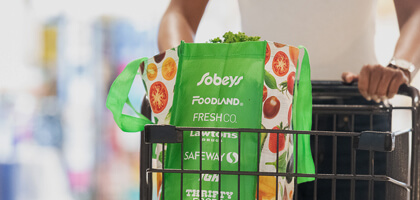
Progress Highlights
GOAL
Reduce avoidable and hard-to-recycle plastics
METRIC
800M
single-use plastic checkout bags removed from circulation from our stores across Canada.
GOAL
Improve waste diversion in our stores
METRIC
247
IGA stores in Quebec are certified on the Action Reduction Program, a program developed by Earth Day Canada to enable our stores to set concrete goals and communicate their waste reduction commitments to customers.
GOAL
Make it easier for customers to reuse
METRIC
8 out of 10
We have a variety of convenient reusable bag and tote checkout options available to our customers. During fiscal 2021, 8 out of 10 times, our customers are bringing their own reusable bags or not using a bag at all when shopping in our stores.

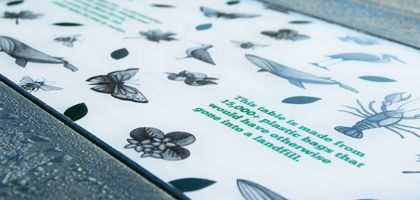
How We’re Making a Difference
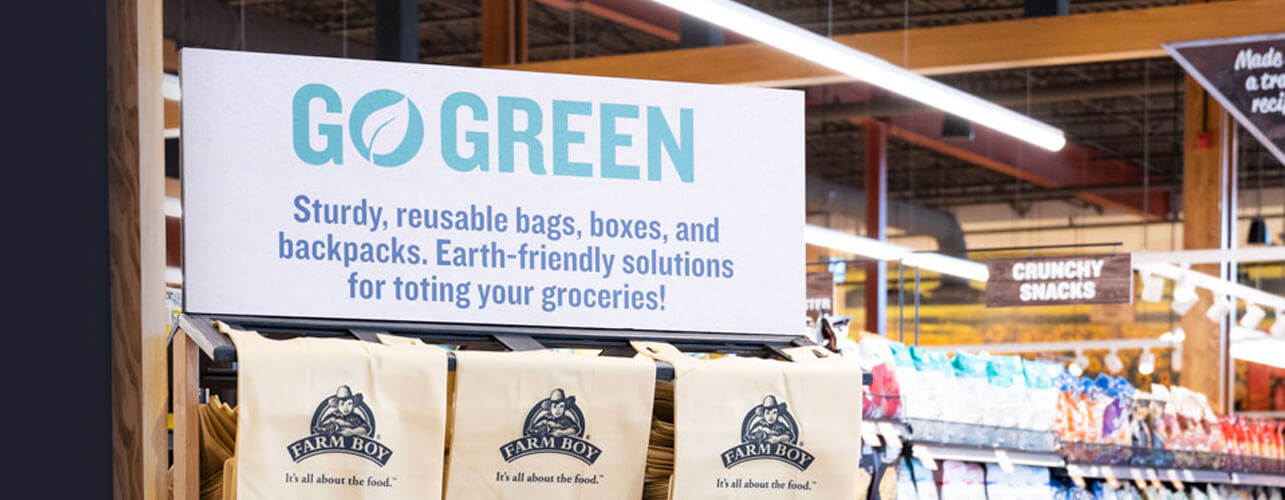
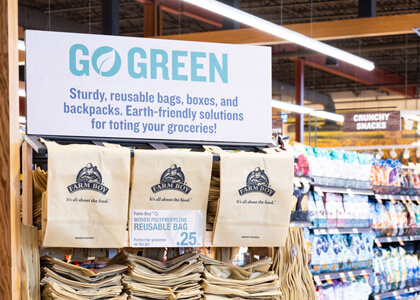
So Long Plastic Bags
In 2019 we committed to doing our part to remove avoidable plastics from the retail grocery industry in Canada — including our commitment to eliminate single-use plastic bags at our checkouts. Since then we’ve made steady progress, removing single-use plastic checkout bags at all our Sobeys stores in early 2020, then at all our Atlantic Canadian brands and IGA in Québec that fall. In the spring of 2021, we continued the initiative in FreshCo, Safeway, IGA West, Foodland Ontario, Boni-choix, Tradition, Farm Boy, Needs and Fast Fuel sites. Today, we’re proud that all of our stores nationwide have eliminated single-use plastic checkout bags, and the newest member of our family — Longo’s — is making progress towards achieving the goal too. We’re the first national grocery retailer in Canada to target eliminating single-use plastic grocery bags across the country, taking what amounts to 800 million plastic bags out of circulation every year. We’re grateful to our customers for working with us to achieve this milestone — and for continuing to work with us on our journey to reduce plastics and adopt packaging that’s better for future generations and our planet.
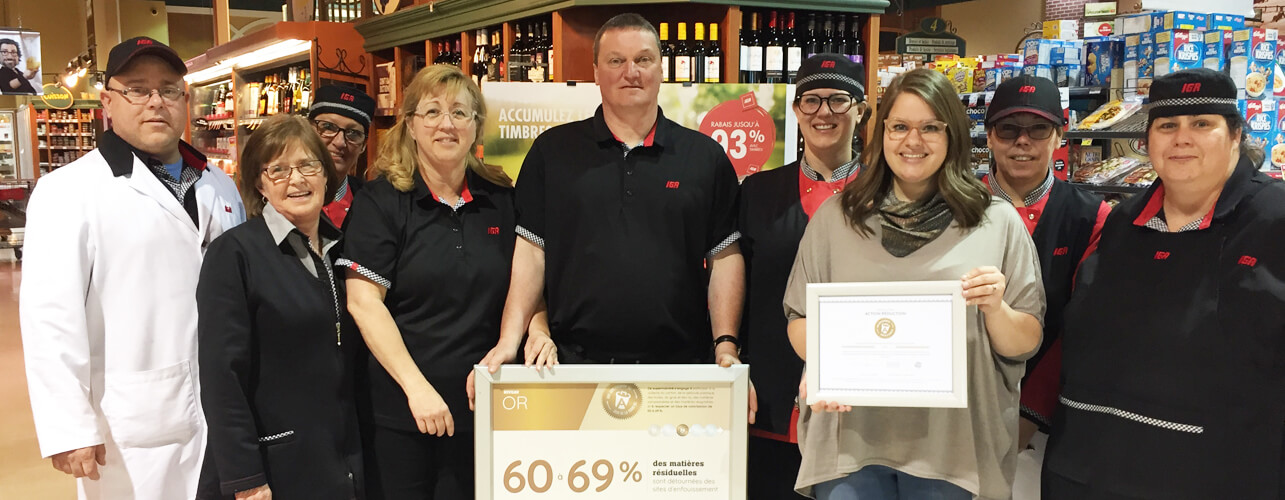
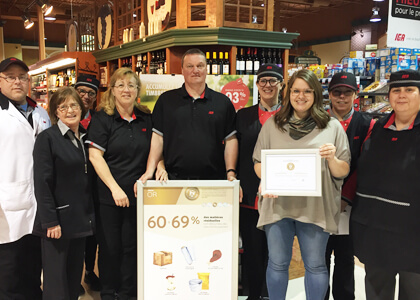
Certified Waste Warriors
Earth Day Canada created the Action/Reduction Program, a certification program adapted for supermarkets, to recognize their environmental sustainability efforts, enable them to set concrete goals and communicate their waste reduction commitments to customers. The program’s certification consists of six levels, beginning with the collection of cardboard and plastic film from stores all the way to the highest level of certification, which requires stores to use all available waste diversion streams to achieve an overall diversion rate of 80 per cent or more. In fiscal year 2021, our IGA team grew the number of its stories certified under Action/Reduction to 247. We aim to expand this program to our other banners over the coming years.
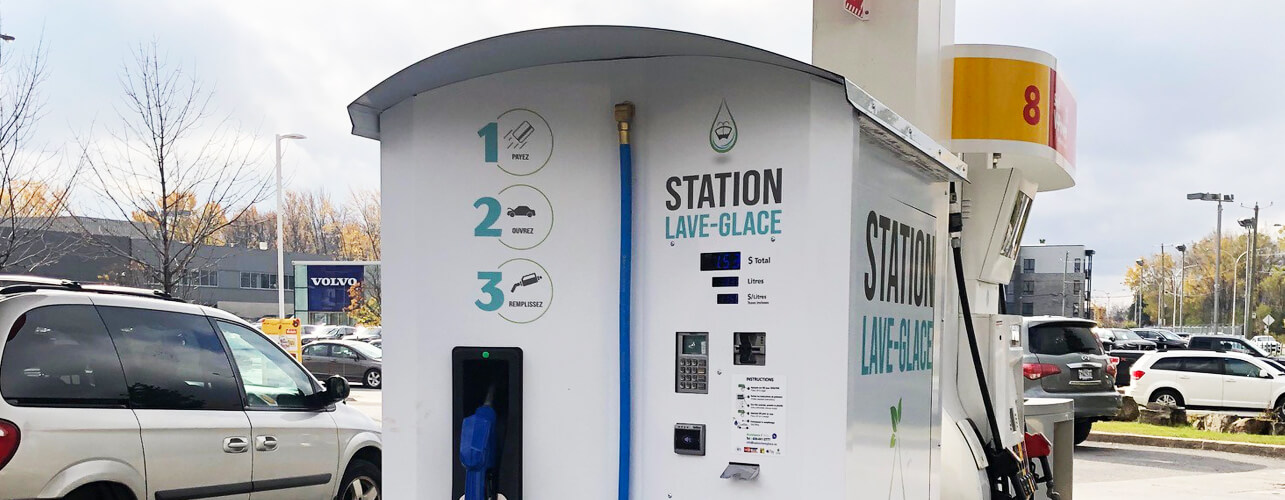
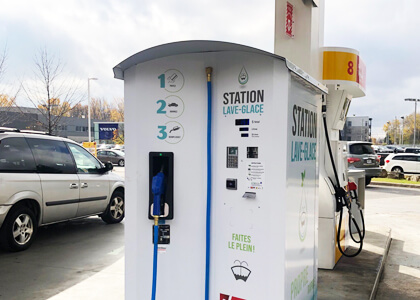
Windshield Washer without the Waste
Canada’s often harsh driving conditions means that window washing fluid is not just a nice-to-have — it’s a necessity. In Québec, seven of our Shell service stations have been piloting a new way to deliver window washer in a way that cuts out plastic containers altogether. Customers who stop for gas can also use a new conveniently located pump-style vending machine to refill their window washer at the same time. Each vending-machine tank holds the equivalent of 211 plastic containers. Since the pilot began in October 2020, the equivalent of over 3,000 plastic containers has been taken out of circulation. Based on the results of our pilot, we’re evaluating the potential to expand this eco- and driver-friendly solution to more customers.


Eco-kits Help Customers go Green
The Fonds Éco IGA and Earth Day Canada join forces each year to offer low-cost eco-kits to customers in Québec and New Brunswick. In fiscal year 2021, the eco-kits were composed of 100 per cent Québec-made products empowering customers to shift towards a more eco-responsible daily life. Since its inception in 2019, the program has distributed more than 350 used battery collectors, nearly 24,000 household composters and more than 90,000 rainwater barrels. In 2021, Earth Day team members visited 225 IGA stories to promote the kits, which included fabric covers, a food storage bag, reusable towels, and a washable sponge.

